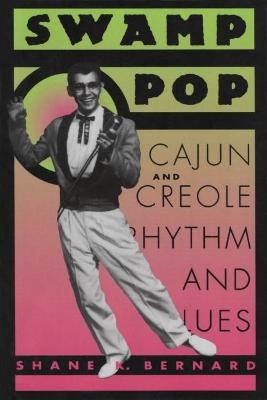
Swamp Pop
Cajun and Creole Rhythm and Blues
Seiten
1996
University Press of Mississippi (Verlag)
978-0-87805-876-1 (ISBN)
University Press of Mississippi (Verlag)
978-0-87805-876-1 (ISBN)
Drawing on more than fifty interviews with swamp pop musicians in South Louisiana and East Texas, this book explores the roots of this often overlooked, sometimes derided sister genre of the wildly popular Cajun and zydeco music.
Music of Louisiana was at the heart of rock-and-roll in the 1950s. Most fans know that Jerry Lee Lewis, one of the icons, sprang out of Ferriday, Louisiana, in the middle of delta country and that along with Carl Perkins and Elvis Presley he was one of the very first of these ""white boys playing black music."" The genre was profoundly influenced by New Orleans, a launch pad for major careers, such as Little Richard's and Fats Domino's.
The untold ""rest of the story"" is the story of swamp pop, a form of Louisiana music more recognized by its practitioners and their hits than by a definition. What is it? What true rock enthusiasts don't know some of its most important artists? Dale and Grace (""I'm leaving It Up to You""), Phil Phillips (""Sea of Love""), Joe Barry (""I'm a Fool to Care""), Cooke and the Cupcakes (""Mathilda""), Jimmy Clanton (""Just a Dream), Johnny Preston (""Runnin' Bear""), Rod Bernard (""This Should Go on Forever""), and Bobby Charles (""Later, Alligator"")? There were many others just as important within the region.
Drawing on more than fifty interviews with swamp pop musicians in South Louisiana and East Texas, Swamp Pop: Cajun and Creole Rhythm and Blues finds the roots of this often overlooked, sometimes derided sister genre of the wildly popular Cajun and zydeco music. In this first book to be devoted entirely to swamp pop, Shane K. Bernard uncovers the history of this hybrid form invented in the 1950s by teenage Cajuns and black Creoles.
They put aside the fiddle and accordion of their parents' traditional French music to learn the electric guitar and bass, saxophone, upright piano, and modern drumming trap sets of big-city rhythm-and-blues. Their new sound interwove country-and-western and rhythm-and-blues with the exciting elements of their rural Cajun and Creole heritage. In the 1950s and 1960s American juke boxes and music charts were studded with swamp pop favorites.
Music of Louisiana was at the heart of rock-and-roll in the 1950s. Most fans know that Jerry Lee Lewis, one of the icons, sprang out of Ferriday, Louisiana, in the middle of delta country and that along with Carl Perkins and Elvis Presley he was one of the very first of these ""white boys playing black music."" The genre was profoundly influenced by New Orleans, a launch pad for major careers, such as Little Richard's and Fats Domino's.
The untold ""rest of the story"" is the story of swamp pop, a form of Louisiana music more recognized by its practitioners and their hits than by a definition. What is it? What true rock enthusiasts don't know some of its most important artists? Dale and Grace (""I'm leaving It Up to You""), Phil Phillips (""Sea of Love""), Joe Barry (""I'm a Fool to Care""), Cooke and the Cupcakes (""Mathilda""), Jimmy Clanton (""Just a Dream), Johnny Preston (""Runnin' Bear""), Rod Bernard (""This Should Go on Forever""), and Bobby Charles (""Later, Alligator"")? There were many others just as important within the region.
Drawing on more than fifty interviews with swamp pop musicians in South Louisiana and East Texas, Swamp Pop: Cajun and Creole Rhythm and Blues finds the roots of this often overlooked, sometimes derided sister genre of the wildly popular Cajun and zydeco music. In this first book to be devoted entirely to swamp pop, Shane K. Bernard uncovers the history of this hybrid form invented in the 1950s by teenage Cajuns and black Creoles.
They put aside the fiddle and accordion of their parents' traditional French music to learn the electric guitar and bass, saxophone, upright piano, and modern drumming trap sets of big-city rhythm-and-blues. Their new sound interwove country-and-western and rhythm-and-blues with the exciting elements of their rural Cajun and Creole heritage. In the 1950s and 1960s American juke boxes and music charts were studded with swamp pop favorites.
| Verlagsort | Jackson |
|---|---|
| Sprache | englisch |
| Maße | 152 x 229 mm |
| Gewicht | 333 g |
| Themenwelt | Kunst / Musik / Theater ► Musik ► Jazz / Blues |
| Kunst / Musik / Theater ► Musik ► Pop / Rock | |
| ISBN-10 | 0-87805-876-1 / 0878058761 |
| ISBN-13 | 978-0-87805-876-1 / 9780878058761 |
| Zustand | Neuware |
| Haben Sie eine Frage zum Produkt? |
Mehr entdecken
aus dem Bereich
aus dem Bereich
zur politischen Ästhetik des Jazz
Buch | Hardcover (2023)
Phillip Reclam (Verlag)
38,00 €
Die Geschichte des Jazz in Deutschland
Buch | Softcover (2021)
Reclam, Philipp (Verlag)
20,00 €


